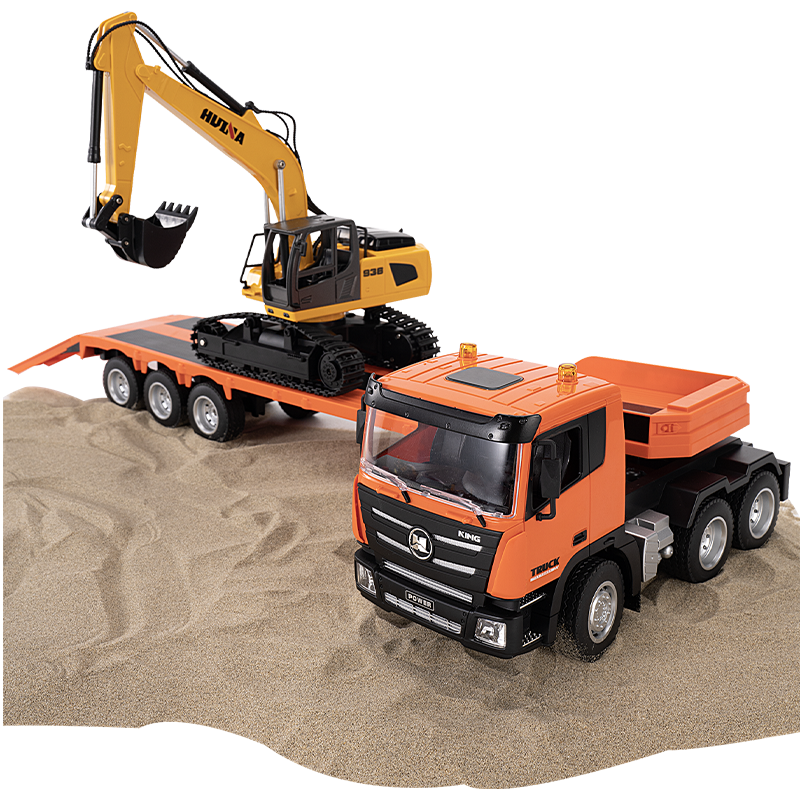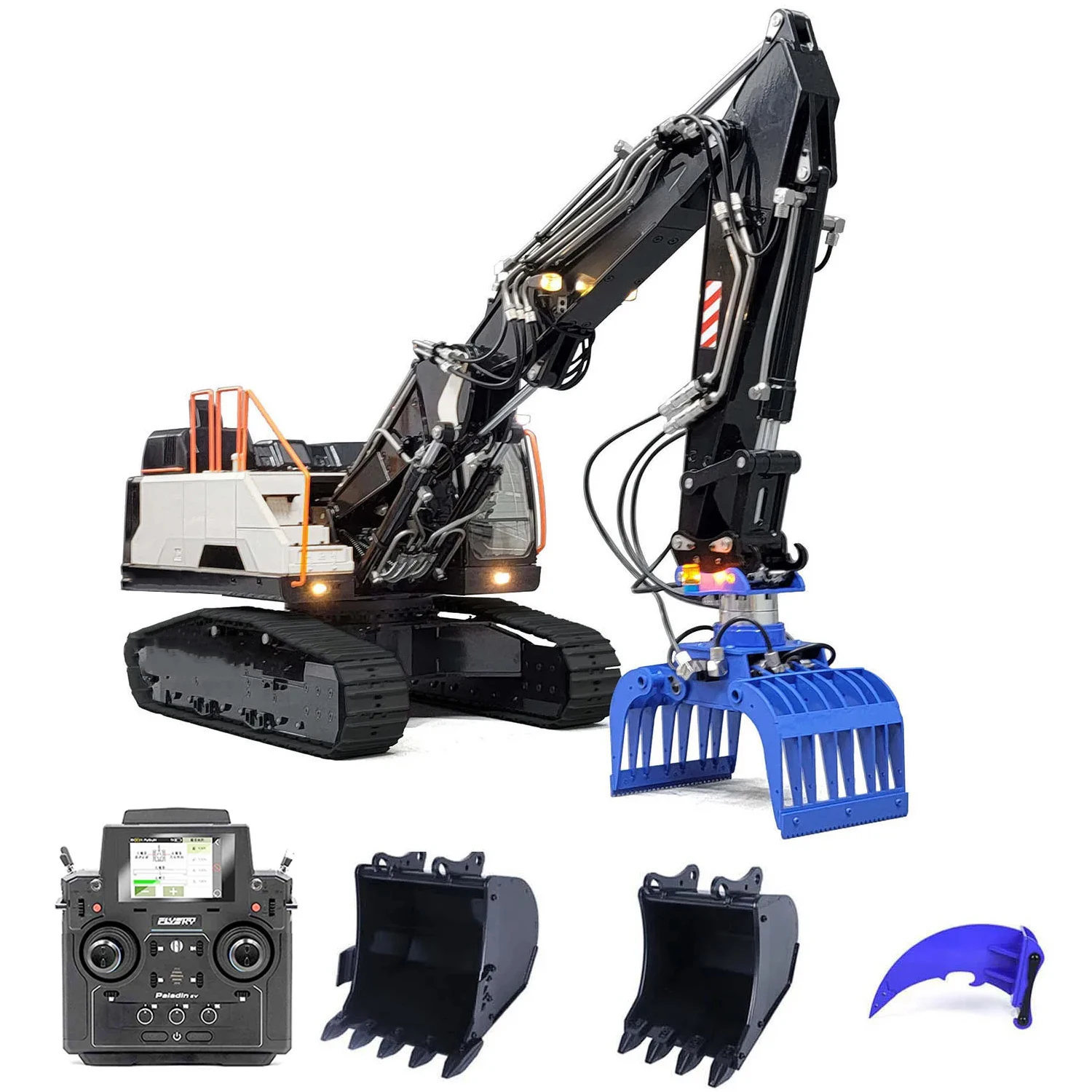How to Maintain Your rc excavator for Longevity and Optimal Performance
Discover the Importance of Excavator in Modern Construction Projects
Excavators are vital tools in modern construction tasks. Their convenience enables them to carry out a large range of tasks, from excavating and grading to demolition and website prep work. Advanced functions, such as hydraulic attachments and GPS, improve their capabilities and efficiency on task websites. As the industry advances, the importance of excavators expands even more. Understanding their role can reveal insights right into the future of building methods. What exists in advance for these machines?
The Flexibility of Excavators in Various Projects
Excavators are frequently associated with massive construction projects, their versatility permits them to be utilized in a broad variety of applications, from domestic landscaping to utility upkeep. In urban setups, excavators can browse limited spaces to dig foundations for homes or install water drainage systems. Their capacity to perform fragile tasks makes them suitable for landscape design tasks, where they can dig deep into for ponds or plant trees. On top of that, excavators play an important role in energy maintenance, successfully digging trenches for pipes or cable televisions without interfering with bordering locations. In farming applications, they help in land clearing and soil prep work. In addition, their versatility allows them to be furnished with various add-ons, improving their performance throughout various tasks. This complex nature of excavators not just streamlines various construction processes yet additionally shows their indispensable duty in modern facilities advancement and maintenance.
Secret Functions and Kinds Of Excavators
The conversation on crucial attributes and kinds of excavators highlights the important features that make these machines indispensable in construction. Various excavator types, each made for certain jobs, show their versatility and efficiency throughout different applications. rc excavator. Comprehending these attributes and classifications is essential for maximizing their usage in modern construction projects
Excavator Types Review
Excavators play a crucial role in contemporary construction, providing versatility and effectiveness across different jobs. These hefty equipment units can be found in several types, each tailored for particular applications. One of the most typical kinds include crawler excavators, recognized for their security on irregular surface, and wheeled excavators, which offer higher flexibility on smooth surfaces. Tiny excavators are preferred for small tasks and limited spaces, while long-reach excavators are created for deep digging. Additionally, there are customized excavators, such as hydraulic excavators, which improve power and precision. Each kind includes distinct capabilities, making them essential for tasks varying from excavating and grading to demolition and material handling. Recognizing these variations allows building experts to pick the right excavator for their job requires.
Secret Features Explained
Recognizing the crucial attributes of excavators boosts their effective application in building projects. Excavators are identified by their powerful hydraulic systems, which give the essential pressure for digging, lifting, and moving products. Their expressed arms permit for a variety of activity, facilitating specific operations in restricted spaces. Furthermore, the range of add-ons, such as buckets, grapples, and augers, expands their versatility to meet different job demands. The dimension and weight of excavators additionally add to their security and maneuverability on different terrains. Innovations in innovation have led to the integration of GPS and automation, improving accuracy and efficiency in excavation jobs. These attributes collectively position excavators as crucial devices in modern-day building and construction.
Applications in Construction
Transforming building and construction sites, excavators play a critical duty throughout various applications, varying from household building projects to large framework advancements. These flexible machines are furnished for tasks such as digging foundations, trenching for utilities, and website grading. Different kinds of excavators, consisting of crawler, rolled, and mini excavators, provide specific advantages customized to the task demands. Spider excavators master rough terrains, while rolled excavators use wheelchair on smooth surfaces. Miniature excavators are optimal for confined areas, making them preferred in metropolitan settings. The effectiveness and power of excavators significantly speed up construction processes, making certain timely task conclusion. Their flexibility better improves their value, permitting construction groups to deal with a varied array of difficulties effectively.
Enhancing Effectiveness and Performance on Work Sites
Making the most of efficiency and productivity on task sites is an essential objective in contemporary building and construction. Excavators play a critical function in accomplishing this objective by improving numerous jobs. Their capacity to execute several functions-- such as digging, grading, and training-- decreases the need for added devices, therefore conserving time and resources.Moreover, excavators improve operations by enabling faster conclusion of projects. With sophisticated attributes like hydraulic add-ons and general practitioners modern technology, they can carry out precise operations that reduce mistakes and remodel. This precision not just enhances the high quality of job however likewise optimizes product usage, adding to set you back savings.The convenience of excavators permits them to adapt to various site problems, making sure that projects advance efficiently no matter challenges. By integrating excavators right into construction processes, groups can substantially improve their general efficiency, causing prompt job conclusion and enhanced productivity.
Safety Benefits of Utilizing Excavators
Excavators greatly boost safety and security on construction sites through boosted driver presence and reduced manual labor threats. By offering drivers with a clear sight of their surroundings, excavators assist to protect against crashes and injuries. Additionally, the machinery decreases the need for employees to participate in dangerous manual jobs, better promoting a safer workplace.
Boosted Driver Exposure
Construction websites can be disorderly and filled with prospective hazards, enhanced driver exposure plays a vital function in ensuring safety and security when using excavators. Modern excavators are made with huge, unblocked windows and strategically placed mirrors, permitting operators to preserve a clear sight of their environments (rc excavator). This boosted presence is vital for spotting pedestrians, other equipment, and different obstacles, considerably decreasing the threat of web link accidents. Furthermore, many excavators integrate innovative innovation, such as cameras and sensors, to give drivers with extra point of views, even more enhancing awareness. The capacity to see more plainly not only help in efficient operation yet additionally cultivates a more secure job atmosphere, making it simpler for drivers to browse complicated building sites without jeopardizing safety requirements
Lowered Manual Labor Dangers
When hands-on labor is reduced with using excavators, various safety benefits emerge, significantly improving the well-being of building and construction workers. Excavators reduce the physical pressure connected with heavy training and repeated jobs, efficiently reducing the threat of bone and joint injuries. By automating procedures such as excavating, grading, and moving products, they allow workers to preserve a safer distance from possible hazards. In addition, excavators are geared up with advanced security attributes, such as rollover security systems and boosted operator functional designs, which additionally guard personnel on website. The outcome is a substantial reduction in workplace crashes and injuries, causing increased efficiency and morale amongst building teams. Eventually, the fostering of excavators adds to a much safer and a lot more efficient construction setting.
Excavators in Earthmoving and Website Preparation
In modern-day building and construction, a considerable portion of earthmoving and site preparation jobs counts on the effectiveness and versatility of excavators. These makers are made to manage different dirt kinds and surface, making them vital for grading, digging, and trenching tasks. Their hydraulic arms can be geared up with different accessories, such as containers and augers, enabling operators to personalize their technique based upon details job requirements.Excavators stand out at relocating huge quantities of planet browse around this site promptly and successfully, which increases the total building timeline. They can navigate limited spaces and testing websites where conventional tools might have a hard time, enhancing performance. In addition, the precision of excavators assurances that site preparation abides by stringent requirements, lessening the threat of errors that can bring about expensive rework.
The Function of Excavators in Demolition Tasks
Excavators play a necessary role in demolition tasks, as they have the power and agility needed to take down structures effectively. Outfitted with different accessories such as hydraulic breakers, shears, and grapples, these machines can adapt to different demolition demands, whether for tiny buildings or large commercial sites. Their convenience allows operators to take on complicated tasks while maintaining safety and security and precision.In enhancement to their demolition capacities, excavators facilitate particles elimination, ensuring that work sites continue to be secure and well organized. By damaging down frameworks into manageable pieces, they enable structured clearing and recycling of products, straightening with modern-day sustainability efforts.Moreover, excavators can access tight spaces and browse irregular terrain, making them important in urban demolition jobs. In general, their robust style and multifunctionality make excavators a crucial asset in the demolition phase of construction, adding considerably to job timelines and performance.


Future Fads in Excavator Innovation and Use
As the building sector advances, improvements in excavator technology are positioned to change their usage and effectiveness noticeably. One considerable pattern is the combination of automation and man-made knowledge, enabling excavators to run with minimal human treatment. This shift will boost accuracy in jobs such as grading and trenching, lowering human error and enhancing productivity.Additionally, the rise of electrical and hybrid excavators is shaping a much more sustainable construction atmosphere, lowering carbon discharges and gas my company prices. Boosted telematics systems are also emerging, making it possible for real-time monitoring of equipment efficiency and maintenance demands, which can lead to much better operational effectiveness and longer equipment lifespan.Moreover, improvements in accessory innovation are increasing the flexibility of excavators, permitting them to carry out a broader series of tasks. The mix of these fads shows a future where excavators are smarter, greener, and much more versatile, eventually improving construction job characteristics.
Regularly Asked Concerns
Just How Do Excavators Compare to Various Other Building Machinery?
Excavators, defined by their convenience and power, master digging and earthmoving compared to various other equipment. Their ability to do various tasks, including training and demolition, makes them indispensable in building and construction projects, boosting total performance.

What Is the Average Life Expectancy of an Excavator?
The ordinary lifespan of an excavator commonly varies from 7,000 to 10,000 operating hours, relying on upkeep, usage conditions, and design. Proper care can prolong this lifespan, guaranteeing peak efficiency throughout its operational years.
Just How Are Excavators Maintained for Optimal Efficiency?
Excavators call for normal maintenance for peak performance, consisting of regular assessments, fluid checks, filter replacements, and prompt repair work. Applying a precautionary upkeep timetable helps prolong their lifespan and assurances efficient procedure in various building atmospheres.
What Are the Costs Connected With Getting an excavator vs. leasing?
The prices related to leasing versus acquiring an excavator differ considerably. Renting out offers lower upfront costs but can gather in time, while purchasing calls for a significant preliminary investment, however supplies lasting savings and possession ownership benefits.
What Training Is Required to Operate an Excavator?
Operating an excavator requires specialized training, normally consisting of safety methods, equipment procedure techniques, and environmental understanding. Qualification programs commonly mandate practical experience, allowing operators to take care of numerous tasks efficiently while making sure compliance with industry guidelines. The most usual types consist of spider excavators, recognized for their security on unequal terrain, and rolled excavators, which give greater wheelchair on paved surfaces. Miniature excavators are favored for small jobs and tight spaces, while long-reach excavators are created for deep excavating. Additionally, there are customized excavators, such as hydraulic excavators, which improve power and precision. Various kinds of excavators, including spider, rolled, and mini excavators, supply particular advantages tailored to the project needs. Crawler excavators excel in rough terrains, while rolled excavators offer flexibility on smooth surface areas.